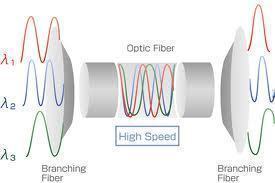DWDM (Dense Wavelength Division Multiplexing)
DWDM stands for Dense Wavelength Division Multiplexing. DWDM is a technology used to increase the capacity of fiber optics that results in faster transfers of data.
What are fiber optics?
Fiber optics are very thin and small fibers that are used to transmit data and light throughout a computer and network.
How does DWDM affect fibers?
The DWDM takes different signals and sends them at varying wavelengths simultaneously along a single fiber. This allows a fiber to increase its capacity and in effect makes it seem as if there are multiple fibers stemming from a single fiber.
What effect does this have?
As an example, consider a fiber in a system that has a capacity to transmit one gigabyte per second. With a DWDM, this fiber now can receive eight different wavelengths. Thus the capacity is increased to eight gigabytes per second. This allows for faster efficiency and data transfer.
What is the fastest a fiber can transfer due to DWDM?
In the present, the fastest transmission of data due to the effects of DWDM 5/that has been recorded is four-hundred gigabytes per second.
How many simultaneous wavelengths can be sent with a DWDM?
The most wavelengths that can be sent at any given time is eighty. That means that, using the example above, a one gigabyte per second capacity can be turned into eighty gigabytes per second, simply by using the DWDM technology.
What are some other benefits to DWDM?
Because DWDM allows faster data transfer, Internet protocols, ATM, and SONET transfers all benefit. This allows computers to run networks better and faster as a whole. As one can see from the above increase in efficiency, the increase in speed of data transmission is drastic.
Another benefit to DWDM is it avoids the necessity to lay new fiber as it simply increases the efficiency of existing fiber. This makes DWDM both more convenient and also more fiscally beneficial as it would cost extra money to law new fiber down.


Comments - One Response to “DWDM (Dense Wavelength Division Multiplexing)”
Sorry but comments are closed at this time.